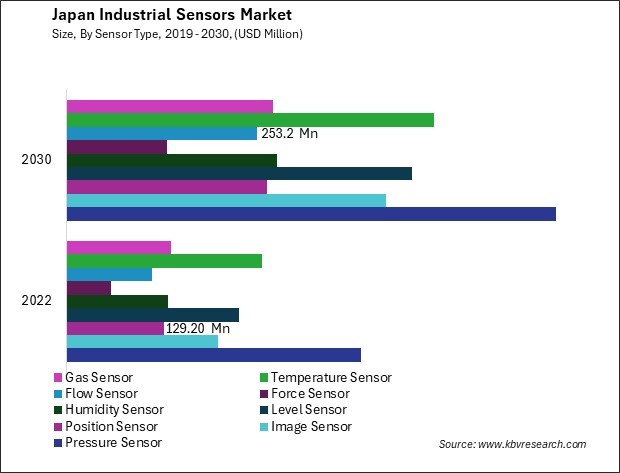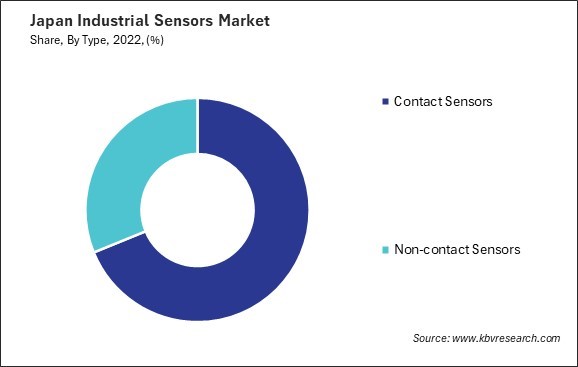The Japan Industrial Sensors Market size is expected to reach $3.2 Billion by 2030, rising at a market growth of 8.8% CAGR during the forecast period. In the year 2022, the market attained a volume of 11448.8 thousand units, experiencing a growth of 11.5% (2019-2022).
The industrial sensors market in Japan stands as a pivotal component of the nation's advanced manufacturing landscape, renowned for its technological prowess and commitment to innovation. Japan's industrial sensors market has experienced significant growth in recent years, driven by the country's emphasis on Industry 4.0 and the Internet of Things (IoT). Japanese manufacturers increasingly integrate sensors into their production processes to enable real-time monitoring and data-driven decision-making.

One of the key sectors driving the demand for industrial sensors in Japan is automotive manufacturing. Japanese automotive giants strongly emphasize precision and quality, relying on advanced sensors for tasks such as quality control, predictive maintenance, and process optimization. Additionally, the robotics industry in Japan, which plays a crucial role in manufacturing, has witnessed a surge in the adoption of sensors for improved robotic performance and safety.
Environmental sustainability is another focal point for the industrial sensors market in Japan. As the nation strives to achieve its environmental goals, sensors are being deployed to monitor energy consumption, reduce waste, and enhance overall resource efficiency in manufacturing processes. Japan's strong emphasis on quality control and reliability extends to the sensors used in manufacturing processes. The "Made in Japan" label is synonymous with precision and durability, and this reputation extends to the sensors embedded in machinery and production lines.
The COVID-19 pandemic has also had a profound impact on the industrial sensors market in Japan. The initial disruptions in the supply chain and manufacturing processes, coupled with lockdown measures, led to a temporary slowdown in the market. However, the pandemic acted as a catalyst for the adoption of automation and digitalization in the manufacturing sector. Japanese industries realized the importance of resilient and agile manufacturing processes, leading to an increased focus on implementing sensor-based technologies.
Japan's industrial landscape is witnessing a transformative surge with the escalating adoption of industrial robots within the industrial sensors market. The Japanese industrial sector is strategically leveraging advanced sensor technologies to propel the integration of robotic systems, fostering a new era of automation. One key driver behind this trend is the acute labor shortage in Japan, particularly in industries that require repetitive and physically demanding tasks. Industrial robots equipped with cutting-edge sensors are stepping in to fill this void, offering precision and reliability in tasks ranging from assembly line operations to quality control.
Moreover, Japan's commitment to innovation propels the development of state-of-the-art sensors specifically tailored for industrial applications. These sensors are pivotal in enabling robots to navigate complex environments, collaborate seamlessly with human workers, and execute tasks with unparalleled accuracy. As a result, industries such as automotive manufacturing, electronics, and precision machinery are experiencing a significant uptick in efficiency and output.
According to the International Trade Administration, in 2022, 45% of all industrial robots in the world were originally produced or designed by companies in Japan. The remarkable growth in this industry was evident as orders for industrial robots from Japanese manufacturers achieved a record-breaking $7.35 billion, marking a 1.6% increase from the previous year. Moreover, production in Japan surged by 5.6%, setting a new record in the field. In 2021, Japan boasted an impressive ratio of 631 robots for every 10,000 humans in the manufacturing sector, reflecting the nation's dedication to harnessing the potential of automation and robotics across various industries.
The Japanese government, recognizing the pivotal role of industrial robots in the nation's economic revitalization, has implemented targeted policies to support their integration. Initiatives such as the "Robot Revolution Initiative" and the "Connected Industries" program provide financial incentives, tax breaks, and regulatory support for businesses investing in automation technologies, including industrial robots and sensors. Thus, Japan's industrial landscape is undergoing a transformative shift driven by the widespread adoption of industrial robots and advanced sensors, addressing labor shortages and enhancing efficiency across key sectors.
In recent years, Japan has witnessed a substantial surge in the demand for electric vehicles (EVs), consequently influencing the industrial sensors market in the country. One key factor contributing to the increased demand for EVs in Japan is the government's proactive approach towards promoting eco-friendly transportation. Stringent emission regulations and incentives for electric vehicle adoption have incentivized Japanese consumers and businesses to transition from traditional combustion engine vehicles to electric alternatives.
According to the Japan Automobile Dealers Association (JADA), sales of new electric vehicles in 2020 reached close to 1.4 million in Japan. New electric vehicles accounted for 36.2% of total new car sales, up from 35.2% in 2019 and 32.9% in 2017. The robust demand for hybrid electric vehicles (HEVs) in Japan has been evident since the introduction of the Toyota Prius in 1997, with HEVs claiming a staggering 97.8% share of the new electric vehicles sold in 2020.
Furthermore, Japan's push towards autonomous driving technologies has increased reliance on advanced sensors for real-time data collection and processing. Industrial sensors ensure the seamless operation and safety of electric vehicles in Japan, especially in collision avoidance systems and autonomous navigation applications.
As Japanese industries prioritize environmental sustainability and technological innovation, the demand for industrial sensors in the context of electric vehicles is expected to witness sustained growth. This trend reflects a commitment to reducing carbon footprints and positions Japan as a leader in integrating electric mobility solutions within diverse industrial landscapes. Hence, Japan's surge in electric vehicle adoption, driven by government initiatives and a focus on environmental sustainability, is significantly boosting the demand for industrial sensors.

The industrial sensors market in Japan has been a dynamic and evolving landscape in recent years, characterized by technological advancements and a growing emphasis on innovation across various industries. One prominent player in the Japanese industrial sensors market is Omron Corporation. Established in 1933, Omron has evolved into a global powerhouse in automation and sensing technologies. The company specializes in a wide array of sensors, including proximity, photoelectric, and vision sensors. Omron's commitment to quality and reliability has positioned it as a trusted partner for the automotive and healthcare industries.
Another influential player is Keyence Corporation, renowned for its cutting-edge sensor technologies. Keyence focuses on developing innovative products such as laser displacement, pressure, and vision sensors. The company's emphasis on research and development has allowed it to stay at the forefront of the industrial sensors market, catering to diverse applications across sectors.
Panasonic Corporation is also a notable contributor to the Japanese industrial sensor landscape. With a history dating back to 1918, Panasonic has grown into a conglomerate with diverse business segments, including industrial solutions. The company's sensor offerings encompass a broad spectrum, from motion sensors to environmental sensors, catering to the evolving needs of industries in Japan and beyond.
In the field of automotive sensors, DENSO Corporation plays a pivotal role. Specializing in advanced automotive technology, DENSO is a key player in developing sensors that enhance vehicle safety, efficiency, and overall performance. The company's presence extends globally, but its roots in Japan contribute significantly to the country's reputation for technological prowess in the automotive sector.
Yokogawa Electric Corporation is deeply entrenched in the industrial automation and control systems sector. Yokogawa's portfolio includes many sensors and instruments crucial for process industries. The company's focus on precision measurement technologies has made it a preferred choice for oil and gas, chemicals, and power generation sectors.
In recent years, emerging players like Alps Alpine Co., Ltd. have gained prominence in the industrial sensors market. Alps Alpine specializes in various sensor types, including environmental and position sensors. The company's agility and responsiveness to industry trends reflect the dynamism inherent in Japan's technology sector. These companies drive technological advancements and contribute significantly to Japan's overall economic resilience. As the nation continues to embrace Industry 4.0 and smart manufacturing, the role of these sensor manufacturers becomes increasingly integral to sustaining Japan's global leadership in precision and quality-driven industries.
By Sensor Type
By Type
By End User
Our team of dedicated experts can provide you with attractive expansion opportunities for your business.

